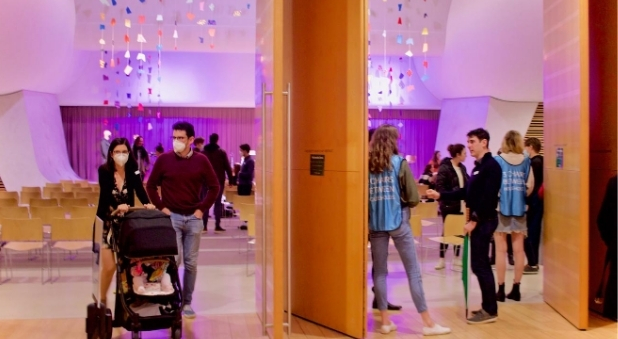For parishes used to welcoming new people with open arms, the advent of taking personal details for contact tracing has made services a little more complex.
Regulars will naturally have no problem giving their details – they already go to the church, after all – but what do you do when someone refuses? And is your church ready to respond appropriately if this does happen?
The rector at St Barnabas’, Broadway, the Rev Mike Paget, had just such an experience on August 2. It was the church’s first Sunday of in-person meetings, and the fourth and final service of the day, when a man sought to walk straight in and had to be stopped.
“He’s someone who has been at church a number of times before, who’s not identified himself to us in the normal ways, but he’s not totally new to us,” Mr Paget says.
“We’re used to having to deal with challenging potential interruptions… that’s just the nature of ministry at Barneys…”
“We have a team of ushers and welcomers… and he swept past them. I was just at the entrance in the auditorium and was able to intercept him and give him the direction that in order to enter the church he needed to provide details because of the current government restrictions… it all went downhill from there.”
When the man became abusive, the church enacted the next stage of its COVID safety plan, which included closing the doors leading to the foyer to insulate the service from any noise, delaying the start of the sermon with a song, contacting a couple of “bigger guys” in the church to come to the foyer and eventually, calling the police. The man left before the police arrived.
Dealing with difficult people is common
“We’re used to having to deal with challenging potential interruptions to services on a reasonably regular basis – that’s just the nature of ministry at Barneys,” Mr Paget says.
“We’ve had Anglicare staff train us in how to deal with people onsite who are aggressive – with perhaps drug use, mental health issues or psychosis behind the behaviour – and if we can avoid confrontation, that’s ideal.
“Often we’d let someone go and sit in church quietly at the back and they might calm down… but the problem with [COVID] is that because of the risk of community transmission we’re not able to pursue that strategy. We have to confront and potentially remove them.”
A thorough safety plan is key
The parish began work on a pandemic safety plan more than a month ago and, as part of that, considered how they would respond in a range of situations. “For example, what do we do if someone starts coughing in the middle of church? Let’s think through that in advance so that when it happens, we’re not all trying to think on our feet while people are freaking out!
“And what do you do if someone becomes more broadly symptomatic in the middle of church? Or walks in off the street and is potentially quite difficult in the middle of church – under the influence of drugs, for example? Or people who, for various reasons of mental health, [find] the collection of those details… very confronting and dangerous?”
Although Mr Paget expects churches in major centres or areas with a high volume of pedestrian traffic are most likely to experience non-compliance issues with Sunday visitors, anecotal evidence suggests funeral directors are also finding the occasional funeral attendee unwilling to provide personal information – so that could happen at any church.
“Having a plan prepared in advance… is really important.”
“Given the current rash of people who are COVID deniers, so to speak, I wouldn’t be surprised if churches experience that kind of thing in some areas of their population,” he says. “Visitors need to know that we’re allowed to require people to give their details – that’s a legitimate thing.”
He adds that although a church service is a public event, churches are private property and, if they have to, can remove people from their grounds.
“Training is crucial – particularly in smaller churches where volunteers are going to be the ones to manage this,” he says. “Having a plan prepared in advance, and ensuring people have prepared what to say, is really important.”
Images from MBM Rooty Hill and St Barnabas Broadway.






















